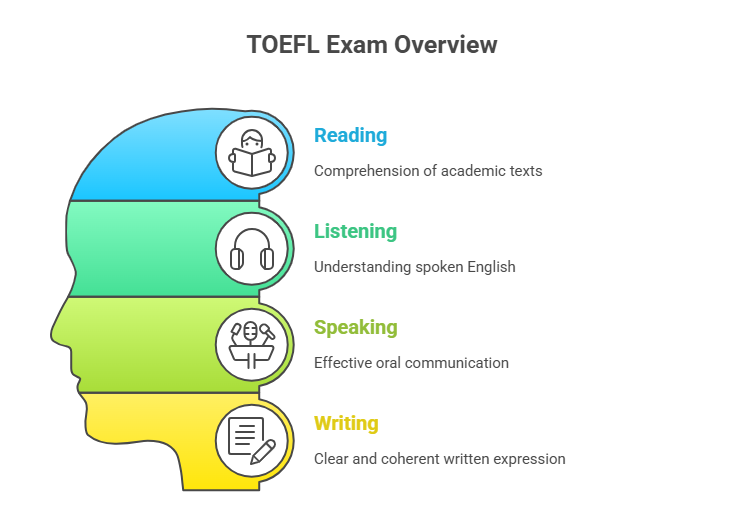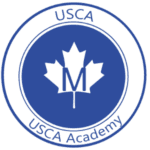Key Highlights of TOEFL Exam for Canada
- The TOEFL exam for Canada 2025 is needed for international students who want to get into canadian universities.
- The TOEFL iBT is used for study visas, but right now it is not accepted for canada immigration or permanent residence.
- Immigration, Refugees and Citizenship Canada (IRCC) has said the new TOEFL Essentials test will be a way for economic immigration, but the full details are coming soon.
- Test takers are scored on four english language skills. These are reading, listening, speaking, and writing.
- The Canadian English Language Proficiency Index Program (CELPIP) and IELTS are still the main tests for permanent residence applications for the time being, at least until the toefl essentials test is ready for use.
Introduction
Are you looking to study or work in Canada? One of the first steps you need to take is to prove your English language proficiency. The TOEFL Exam for Canada is a well-known english language test. It is accepted by many schools and colleges across the country.
This guide will help you understand the whole process for 2025. You will learn about the exam format, who can take it, and what is on the test. Knowing these details is important if you want a student visa or if you are thinking about canada immigration with the toefl test.
TOEFL Exam for Canada 2025: Why It Matters
Passing the TOEFL Exam for Canada is essential for your academic journey, as most Canadian universities conduct their courses in English. Your TOEFL iBT score demonstrates your English proficiency, indicating that you can understand lectures, participate in discussions, and complete writing assignments successfully. This score not only meets the language requirements of institutions but also strengthens your application. Traditionally viewed as a student test, the TOEFL brand is evolving to support those seeking permanent residence in Canada. Understanding its significance for both students and PR applicants is crucial in today’s educational landscape.
TOEFL for Students vs PR Applicants
It is important to understand the difference between using the TOEFL iBT for a study permit and for a PR application. The TOEFL iBT is widely accepted by Canadian universities for student visas and shows your academic English skills. However, for immigration (Express Entry), the TOEFL iBT is not accepted. Skilled worker applicants must take IELTS General Training or CELPIP. This can be confusing, so choose your test based on your goal.
Recently, IRCC approved a new test for Express Entry:
- TOEFL Essentials: A shorter, easier test soon available for Express Entry.
- Implementation: Approved but not yet accepted; check the official IRCC site for updates.
Is TOEFL Better Than IELTS or CELPIP for Canada?
Choosing the right English test for Canada depends on your purpose. For university admissions, TOEFL iBT is widely accepted and preferred by many institutions. If your goal is immigration, CELPIP and IELTS General Training are typically required, though TOEFL Essentials and PTE Core have recently been approved by IRCC, giving more options. TOEFL Essentials is shorter and focuses on practical language skills, which may suit some applicants better. Ultimately, your choice should align with your academic or immigration needs, as test acceptance varies. Here’s a quick comparison for immigration purposes:
| Test | Primary Use in Canada | Key Feature |
|---|---|---|
| TOEFL iBT | University Admissions | Not accepted for PR. |
| IELTS General | PR & Immigration | Widely available globally. |
| CELPIP | PR & Immigration | Uses Canadian accents and vocabulary. |
| TOEFL Essentials | PR & Immigration (Future) | Shorter test (1.5 hours), practical tasks. |
TOEFL Exam Format
The TOEFL exam in Canada checks how well you use English in class or school settings. The test has four parts: Reading, Listening, Speaking, and Writing. The regular TOEFL iBT test takes about two hours. You need to go to a safe test center to do it.
There is also the TOEFL Essentials test. It is a newer choice. This essentials test is shorter and uses an adaptive style. It takes only one and a half hours. Both the TOEFL ibt test and the TOEFL essentials test help people show they can use English clearly. Now, let’s see how each toefl exam format works for people wanting to study in Canada.
How Does the TOEFL iBT Format Work in Canada?
The TOEFL iBT is the main test accepted by Canadian universities. You take it online at a secure location, making the exam fair for everyone. The test has four sections, designed to match real university classroom tasks. It assesses all your English skills together for example, you might read a text, listen to a related talk, and then answer questions that combine both. This shows if you can connect ideas, a key skill for university. To register and find test centers, check the official ETS website.
The TOEFL iBT includes:
- Reading: Understanding academic texts.
- Listening: Following lectures and discussions.
- Speaking & Writing: Responding and completing integrated tasks.
TOEFL Essentials: A Shorter Alternative
The TOEFL Essentials test is a newer English language proficiency test that takes about one hour and thirty minutes to complete. It is adaptive, so question difficulty changes based on your responses. Unlike the iBT, the Essentials test uses both academic and everyday English, with short tasks reflecting real-life situations. This makes it suitable for people needing English proficiency for work or study. IRCC plans to use the TOEFL Essentials test for Canadian permanent residence, but scores are not yet accepted. When available, it will be another option for immigration.
TOEFL Canada Eligibility 2025: Who Can Apply?
There are no age or education restrictions for taking the TOEFL exam. Anyone needing to demonstrate their English proficiency for school or work can register. When considering TOEFL Canada eligibility, think about your purpose for taking the test, whether for admission to Canadian universities or for immigration purposes.
If you plan to study in Canada, you can opt for the TOEFL iBT. However, for permanent residency through Express Entry, you will need to wait for the official TOEFL Essentials test. The next sections will detail who can take each test.
Who Is Eligible for Canadian Universities?
If you come from a country where English is not the main language, you can take the TOEFL iBT test to meet the language requirements for Canadian universities. TOEFL scores are accepted for undergraduate, graduate, and doctoral programs. Each university sets its own minimum score; most require between 80 and 90 for undergraduate courses, while graduate or doctoral programs may need 100 or higher.
Many Indian students use TOEFL iBT scores when applying to study in Canada. Achieving a good score not only helps you qualify for your chosen program but also supports your application for a Canadian student visa.
Can PR and Express Entry Applicants Take TOEFL?
For years, Express Entry applicants for programs like the Federal Skilled Worker Program or Canadian Experience Class could not use TOEFL iBT scores. Only IELTS General Training or CELPIP were accepted for economic immigration. Now, IRCC is allowing the TOEFL Essentials test for immigration purposes.
Once Express Entry starts accepting it, you can submit TOEFL Essentials scores for your profile, giving skilled workers and trades applicants more options. However, the standard TOEFL iBT is still not accepted for permanent residence. Always check the IRCC website for the latest updates before booking a test, as requirements can change anytime.
TOEFL Exam Syllabus

The TOEFL syllabus for Canada does not ask you to memorize facts. It wants you to show your main language abilities. The exam looks at how you use English in a school or college setting. It tests four big areas: Reading, Listening, Speaking, and Writing.
Your test results and language test results will show how good you are in these skills. This gives schools a clear idea of your language abilities. In the reading part, you will answer questions about passages like the ones you see in a college book. Now, let’s see what each part of the syllabus has for you.
What Does the Reading & Listening Section Include?
The Reading section of the TOEFL checks your ability to understand academic texts in English. You’ll read passages from university-level books and answer questions that test your comprehension, vocabulary, and ability to grasp the main ideas and details.
The Listening section measures how well you understand spoken English in academic and campus situations. You’ll listen to lectures and conversations, then answer questions to show your understanding of main points, important details, and speaker intentions.
Key tasks include:
- Reading: Answer multiple-choice questions about three to four academic texts.
- Listening: Answer questions after hearing talks and conversations.
- These sections assess if your language skills meet Canadian Language Benchmarks for academic success.
How Are Speaking & Writing Evaluated in TOEFL?
The Speaking section evaluates your ability to use English effectively. You respond to prompts by speaking into a microphone, and both AI and human evaluators score your answers. You will discuss familiar topics and respond to what you read and hear, testing your communication in different scenarios.
The Writing section measures your academic writing skills. You complete two tasks: one integrates reading and listening, and the other is an independent essay based on your own ideas. Your total score combines performance from all four sections.
How you are scored:
- Speaking: Points for fluency, vocabulary, and topic development.
- Writing: Graded on organization, grammar, and clarity.
- Your results reflect your overall communication skills.
Quick TOEFL Preparation Tips for Canada 2025
Effective TOEFL preparation for Canada goes beyond just learning; it’s about building confidence and familiarizing yourself with the test format. Start with an official practice test to identify your strengths and weaknesses, allowing you to focus on areas that need improvement. Unlike other English language tests like IELTS, the TOEFL is computer-based, so practicing on a computer is essential. Utilize the best resources and follow a practical study timeline to enhance your skills and readiness for the exam.
Best Resources to Prepare for TOEFL in Canada
It’s important to use top resources for TOEFL preparation in Canada. The most trusted materials come from ETS, the creators of the TOEFL exam. ETS official guides and practice tests closely match real exam questions. Besides official materials, a structured study plan is crucial. Consider joining a prep course at a reputable institution like USCA Academy, known for helping students boost language skills and score higher. Their programs are tailored for Canadian college and university admissions.
Here are some good resources to use:
- Official TOEFL Go! App: Get practice questions and tips right on your phone.
- TOEFL iBT Practice Sets: Free questions from old TOEFL iBT tests.
- Official Guide to the TOEFL iBT Test: A full book with lots of practice tests.
- Reputable Prep Centers: These centers provide useful feedback and skill-building.
How Much Time Do You Need to Prepare?
The time needed for TOEFL preparation in Canada depends on your current English proficiency and target score. Start by taking a full practice test to identify your strengths and areas for improvement. If your English skills are strong and you need only a slight score boost, 4 to 6 weeks of focused study may be enough. Focus on understanding the test format and practicing time management. If you need a significant improvement, plan for a longer preparation period.
A general guideline:
- 1-2 months: Good for those with strong English language skills.
- 3-4 months: Better for those aiming to raise their score by 20+ points.
- 6+ months: Needed for beginners building basic proficiency.
Conclusion
As we finish talking about the TOEFL Exam for Canada in 2025, you can see how important it is to know the format, who can take it, and the topics you need to study. The TOEFL exam shows your English proficiency. It helps international students and PR applicants get into canadian universities and open up more paths for immigration
If you use good tips for getting ready and learn about all the rules, you can make your chances of doing well better. If you have questions or you want help made just for you, feel free to reach out. Your way to reach your goals in Canada starts with this step!
Frequently Asked Questions
1. Can I retake TOEFL immediately if I don’t get the required score for Canada?
No, you cannot take the TOEFL iBT again right away. You must wait at least three days between tests, as set by ETS. This rule helps keep test scores fair and gives you time to get ready before you take the test again. The pause between tests is important if you need your scores for something big, like a university application or Canada immigration, such as Express Entry.
2. How long should I prepare for TOEFL if my goal is Canada PR or university admission?
Preparation time can be different for each person. If you are trying to get into canadian universities or want a study permit, you should plan for about 1 to 3 months. It will depend on your English level right now. If you want Canada PR through express entry You will also need to take new language tests. The timeline will mostly be the same. Try to use the official practice tools. This will help you get used to what canadian universities ask for.
3. How much does the TOEFL exam cost in Canada compared to IELTS?
The price for the TOEFL iBT and IELTS exams in Canada is about the same. The cost is usually from $250 to $350 CAD. The fee might change a little, depending on where you take it. Test takers should look at the official ETS site for TOEFL or the IELTS site to get the exact price in their city.
4. Where are TOEFL test centers located in Canada in 2025?
TOEFL iBT test centers can be found in the big cities of every Canadian province. The best way to find the nearest place that offers the TOEFL iBT test is to go to the official ETS website. On the website, you can type in your city or postal code to get a list of all the test centers and the test day schedules. This is where you can book your exam as well.









